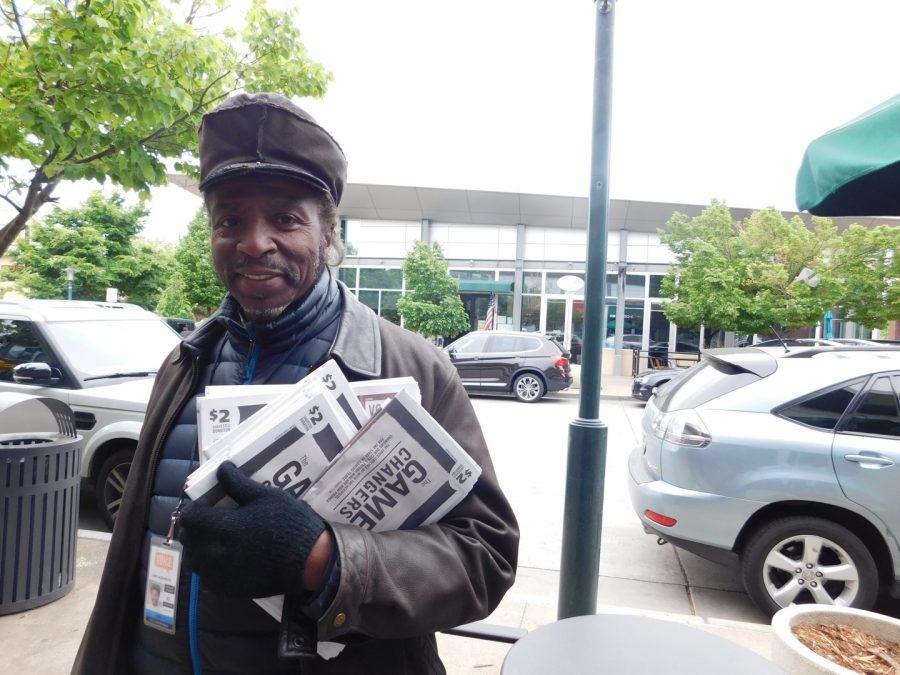Mr. John Alexander, who experienced homelessness and now works to advocate for those in need.
By Cara Williams ’21
“If we believe in Jesus Christ, then we have to help those in need because we believe that they are our brothers and sisters in Jesus Christ”- Mr. Larry Smith
This is homelessness.
In 2016, an estimated 150 million people were homeless worldwide, and 1.6 billion people lacked adequate housing.
Half a million people in the United States were homeless in 2016, and the number has since increased. A quarter of that group were children. 15 percent is chronically homeless, meaning that they have disabilities and have been homeless for over a year.
Colorado especially has an issue with homelessness. The homeless population increased by 13 percent in 2016. Since the population rate is continuously increasing, the housing costs have also increased, leaving a lack of affordable housing.
While experiencing homelessness, these people long for comfort and human interaction. Homelessness can be one of the loneliest experiences for humans. Mr. John Alexander experienced homelessness and told about his story.
Mr. Alexander experienced homelessness from when he was about 40 years old until he was about 60. He became homeless in 1989 when he found himself entrapped in a drug addiction. He prioritized drugs instead of finding a house or a job.
The places he stayed were like saying hello to an old friend, and he didn’t think of sleeping in these places as being homeless. However, he was blessed with an optimistic attitude the whole time and realized that what he was experiencing was only a chapter in his life, not the whole book.
Mr. Alexander came to Denver and started working for the Denver Voice, a newspaper that is produced exclusively by people who are recovering from homelessness. Only after advocating for the homeless for a few years did he realize that he was homeless, for 20 years of his life. He has now been working for the Denver Voice for 10 years and he is also writing a book. He has recovered from his addiction and has been drug-free for the past ten years.
“We need to try to teach [people] to understand. Homelessness is one of the most misunderstood issues in the world today. Common people are the ones who will help solve homelessness, not the government or others,” Alexander said. “But they must understand what it is; how these people are people just like us and have been faced with a situation or circumstances that are out of their control. If people understand, they will have ideas and they will start trying to help.”
Although we may not always feel it here at Regis Jesuit, the effects of homelessness are all around us. At almost every intersection, there is someone asking for help. Many people know someone personally who has become homeless or have experienced homelessness themselves. There is always a way that we can help, especially through service.
Service is very important at this school and it is a large part of the culture. Here at Regis Jesuit, service is continuously prioritized because it helps our ability to recognize the effects of our actions. Doing service, especially when it is related to the homeless, can greatly help and impact people who are in need. Service is also important because it helps us to realize our calling to love as Christ did and to treat all people with respect and kindness.
Mr. Brendan Love, the Girls Division Service Director, thinks that service is very important and is built into our curriculum to fulfill the mission of our school.
“We foster faith in Jesus Christ as well as a commitment to faith and mercy or a faith that promotes mercy… there is an action required,” Love said. “We can include service and love for our neighbor as a part of that action.”
At Regis Jesuit, we have many opportunities to do service within our own school. We have clubs which incorporate service as part of their activities, and we also have clubs that are dedicated to doing service, such as Arrupe Club. We even have clubs that are dedicated to serving specifically the homeless, like Women’s Homeless Initiative. These clubs not only offer opportunities to work with/help the homeless, but they also allow students to help other people who are in need as well.
Ms. Cattelino, Administrative Assistant to the Principal and Moderator of Arrupe Club believes that service as a community brings us together.
“It brings multiple people (students, parents, faculty, alumni, and friends) together for a shared experience of serving God’s people. It can be a bonding experience that makes a community stronger,” Cattelino said.
There are also many other ways that students can help the homeless through service outside of Regis. There are many organizations in which volunteers help serve the homeless, some of these being Denver Rescue Mission, the Samaritan House, Colorado Coalition for the Homeless, Christ in the City, Catholic Charities, and countless others.
One of the organizations that offers the most interaction with the homeless is Christ in the City. This non-profit holds weekly Lunch in the Park in downtown Denver. Volunteers serve food to the homeless and get to know them while they are eating. Through this organization, volunteers can talk to those without a home and hear their stories. Events like these can make a lasting impact on volunteers and students.
Another organization that directly helps the homeless is Catholic Charities. Their mission is to help and provide justice for the poor and needy. In addition, they provide immigration and refugee services, disaster relief, housing, healthcare, food, employment and job training, advocacy, and family, child, and senior services. Their efforts to provide help through the Catholic faith have been very successful, and they have quite a few volunteer opportunities as well.
Mr. Larry Smith, President and CEO of Catholic Charities, reminds us that an organization like Catholic Charities has hundreds, even thousands, of volunteer needs. He believes that volunteering can and will change the world, and if everyone spent a few hours per week volunteering, the impact would be stunning.
He also makes the point that when you give, you actually receive love and gratitude from the person that you are giving to. In this, you become both the giver and the receiver.
“What I tell people quite often is if you really want to help the homeless, start by loving those people who you are closest to. Be charitable at home, do things for people that you don’t really like at school, and that is really being charitable,” Smith said. “If you do that, it will catch on like a wildfire and it will draw people into a giving state. It will make them understand that it is in giving that you receive. If you make that part of your life, giving to receive, you will start to help the homeless eventually.”
Homelessness affects so many people, but it doesn’t need to. If every person in the Church continuously helped the homeless through service and in other ways, homelessness may not exist. This is why we need to do what we can to help the homeless, who were once normal people like us. Jesus Christ calls us to love and serve everyone as He did, and volunteering for anything, especially to help the homeless, helps us to fulfill this calling.
“God is not unjust; He will not forget your work and the love you have shown Him as you have helped His people and continue to help them”- Hebrews 6:10





